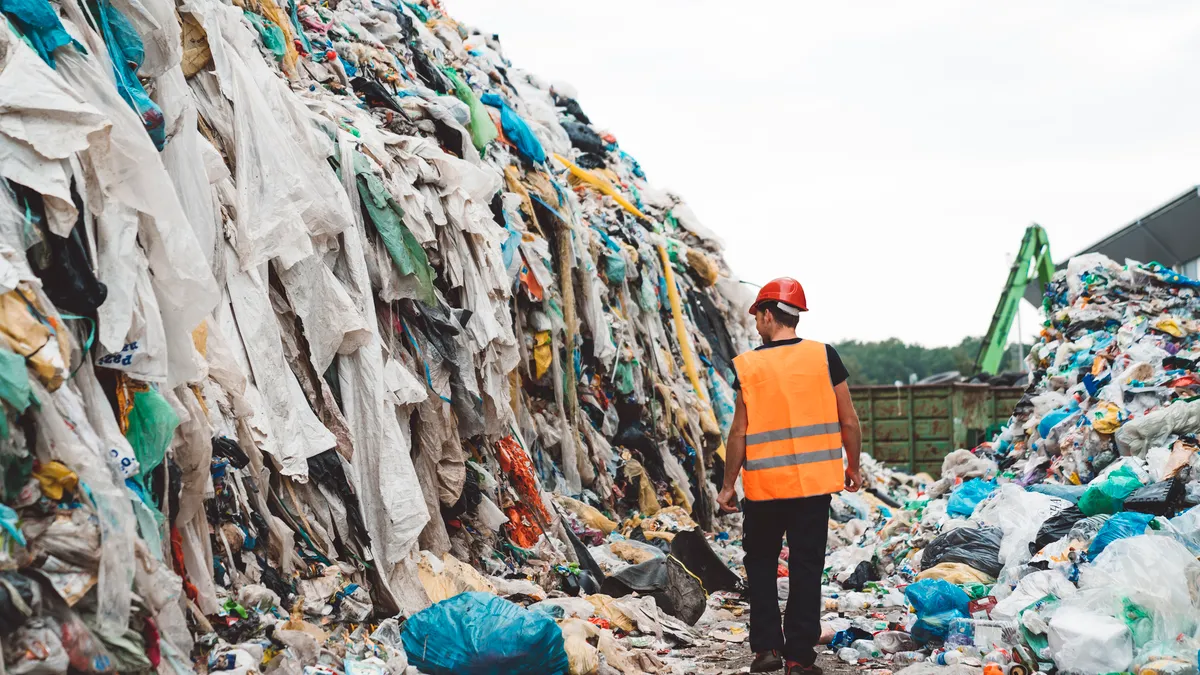Dive Brief:
- U.S. Reps. Chellie Pingree, D-Maine, and Rosa DeLauro, D-Conn., are requesting that the Government Accountability Office look into the state of the domestic textile recycling industry and how the EPA can better facilitate reuse and recycling. Their letter, sent Wednesday morning, cited EPA data finding 7.7% of landfilled municipal solid waste in the U.S. came from textiles.
- The amount of textiles landfilled per capita increased 55% from 2000 to 2018, versus a 20% per capita increase in overall waste, suggesting this category of waste is a worsening problem, according to EPA data.
- "Given the significant and growing impacts fast fashion has on our environment, we are concerned about the ability of our nation to responsibly manage discarded clothing and increasing amounts of textile waste," the letter's signatories wrote.
Dive Insight:
The letter comes as lawmakers worldwide look for solutions to manage the growing waste issues created by the advent of cheap, mass-produced and often plastic fiber clothing known as fast fashion.
In the European Union, those efforts culminated in a textiles strategy that calls for durable, repairable and recyclable products and harmonizes extended producer responsibility rules for the industry, among other measures. The European Commission declared that "fast fashion is out of fashion" as part of the strategy's rollout last year. On Tuesday, the body’s Environment Commissioner also said he wanted to see regulations related to the strategy implemented by 2028, saying the fashion industry has “escaped regulation.”
In an interview, Pingree said she's open to looking into similar measures in the United States, including extended producer responsibility. But she also acknowledged that such rules must be balanced with the difficult realities of pursuing federal recycling legislation and the role of state and local governments.
“At the federal level, we're really just trying to get our foot in the door to say, ‘Hey, this is an expensive issue. It's a big part of our pollution,’” Pingree said. “In the long run, we should have some comprehensive policy. Right now, we should be looking at what the models are like the EU.”
The issue of waste from fast fashion is international. Last week, Pingree spoke on the House floor about satellite images identifying a mountain of fashion waste in Chile's Atacama Desert that reportedly came from several countries, including the United States. In her remarks, the representative said the image "illustrates the environmental toll of what's called fast fashion."
"The federal government can and must do more to stop the waste and pollution. Fast fashion should be sustainable fashion," Pingree said in her speech.
Currently, textiles that aren’t reused or disposed of in the United States are shipped overseas. The pandemic disrupted that process, as countries like Kenya announced pauses on the importation of textiles, but it continues today. The U.S. exports more secondhand clothing than any other country in the world, shipping out about 700,000 metric tons in 2021, according to a UN report.
Pingree said the U.S. should look for better ways to handle the waste than exporting it, including through technology and policy changes.
”You can't use portions of the globe as your own private dump and pretend that there's no consequence to creating waste,” Pingree said. “People are dreaming if they think that we're gonna just continually find places where if we pay enough, they're gonna take it. First off, who wants to keep paying so much money for a problem you could probably resolve in other ways? And second, countries have been very clear: They're not interested.”
A small but growing number of states and municipalities have begun to set up collection programs for the waste, which can help divert material from landfilling and export. Sixteen states and the District of Columbia have some form of statewide program for recycling clothing, according to a survey conducted by Promo Leaf. That survey also found curbside textile recycling service remains limited in major cities.
That kind of service, too, was interrupted during the pandemic but now appears to be returning. Simple Recycling, one of the largest textile collection and recycling services, has restarted service where it had previously paused due to the pandemic, including in towns like Ashland, Massachusetts, Ypsilanti, Michigan and Strongsville, Ohio.
Pingree, who has published books on knitting and mends clothes herself, said she also believes education is necessary to convince American consumers to think more critically about clothing — particularly the hidden costs from paying to dump discarded clothing.
”You say to most people, ‘fast fashion,’ I don't know, their eyes just glaze over,” Pingree said. “But you say, 'Did you realize how much of today's clothing is actually synthetic materials that are going to end up as part of the waste in the ocean or in a dump somewhere?’ ... People pay more attention to that.”












